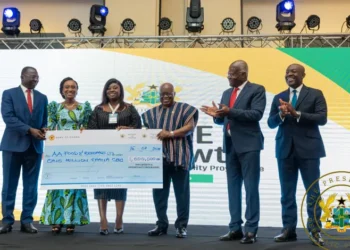Under the auspices of the Ministry of Energy and the World Bank’s Ghana Energy Sector Transformation Initiative Project (GESTIP), a stakeholder engagement exercise took place over the weekend at the Accra Metropolitan Assembly.
The event, which drew in various energy sector agencies, religious bodies, civil society organisations, professional bodies and tradesmen and women, among others, aimed at updating stakeholders on some of the gains under GESTIP, which is funded by the World Bank through several presentations with a discussion segment.
Setting out the background to the project, its Coordinator, Ing James Demitrus, noted that over the years, Ghana’s energy sector has faced some challenges, including gas supply shortages; high payments for installed capacity to Independent Power Producers (IPPs), high distribution losses and low revenue collections by Electricity Company of Ghana among others.
“Ghana has implemented a wide range of power sector reforms, including unbundling its power sector and attracting private investment through Independent Power Producers (IPPs) to improve the supply of electricity,” , Ing James Demitrus said.
GESTIP, Ing Demitrus further stated, is aimed at strengthening the capacity of the power sector to implement sector reforms and improve energy sector planning and coordination in Ghana.
According to the project coordinator, in the lifetime of GESTIP, 46 consultancy activities have been undertaken to resource the beneficiary institutions with the required knowledge and information to further improve their effectiveness and efficiency.
Further, the necessary software and hardware tools have been procured for some of the beneficiary institutions to improve the efficiency of the agencies.
He also disclosed that 142 energy sector staff have been trained in technical fields as well as project management to build their capacity to implement the reforms in the sector.
Beneficiaries of the $20m Project
Beneficiaries of the $20m project, which became effective in February 2019 and will close on 31 December 2023, include the Electricity Company of Ghana (ECG), Ghana Grid Company (GRIDCo), Public Utilities Regulatory Commission (PURC), Energy Commission (EC), Ghana National Petroleum Corporation (GNPC), Northern Electricity Development Company (NEDCO), Volta River Authority (VRA) and the Ministry of Energy.
A similar stakeholder engagement event is slated to take place at the University for Development Studies, Tamale, on Friday 22nd December 2023
The development objective of the Energy Sector Transformation Initiative Project for Ghana is to strengthen the capacity of the energy sector to implement sector reforms, and improve energy sector planning and coordination in Ghana. The project has five components: Management of energy sector financial flows; Sector planning and coordination; Energy access; Natural gas; and Project management.
Management of energy sector financial flows assists in addressing the financial viability of the energy sector by improving revenue management at sector level, improving revenue collection at the utilities’ level, improving organizational structures, and strengthening the power companies’ operational and financial management (FM) functions.
Sector planning and coordination is to enhance planning and coordination across the energy sector, this component will assist the Government to design effective institutional arrangements with clear mandates for the regulatory institutions in the energy sector, conduct technical studies on the sector including electricity sector assessment and a gas sector assessment.
Energy access also has three activities: conducting feasibility and investment planning studies for grid extension and off-grid electrification to reach the Government’s goal for universal electrification by 2030; Preparing a strategy for increasing access to safe clean cooking as committed under SDG 7; and conducting studies to upgrade NEDCo’s sub-transmission, distribution and operational systems to improve its operational efficiency.
READ ALSO: Banks Experience Remarkable Shift in Investment Portfolio As T-Bills Surge by 285% in October 2023





















